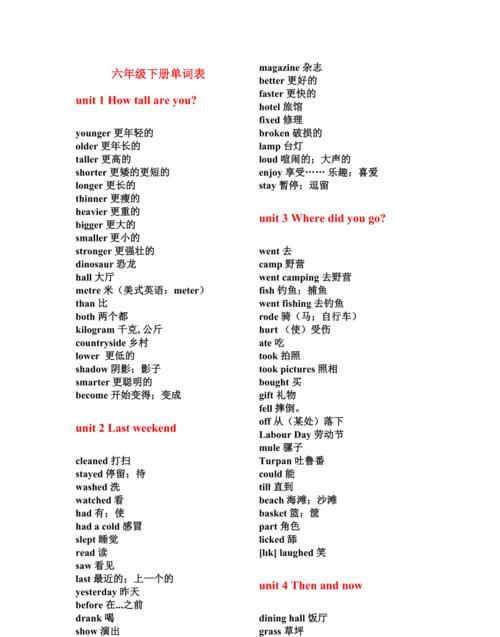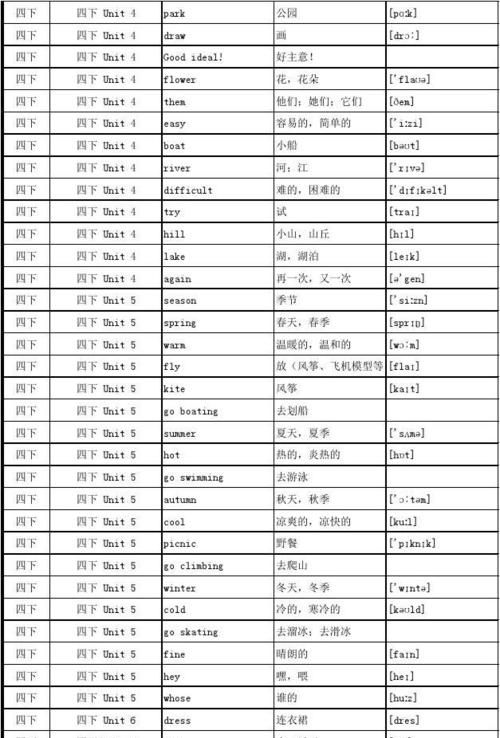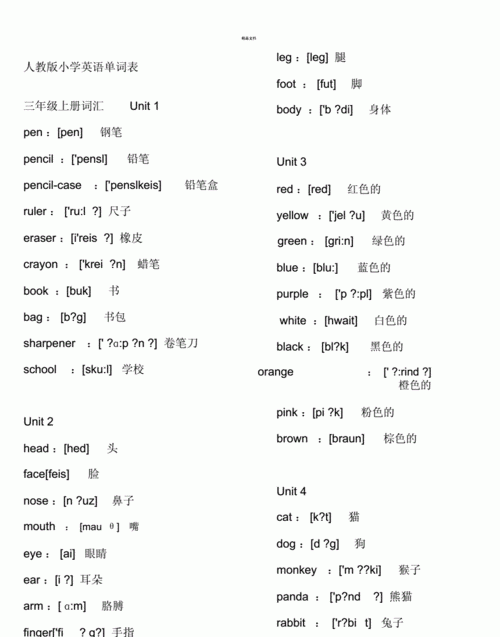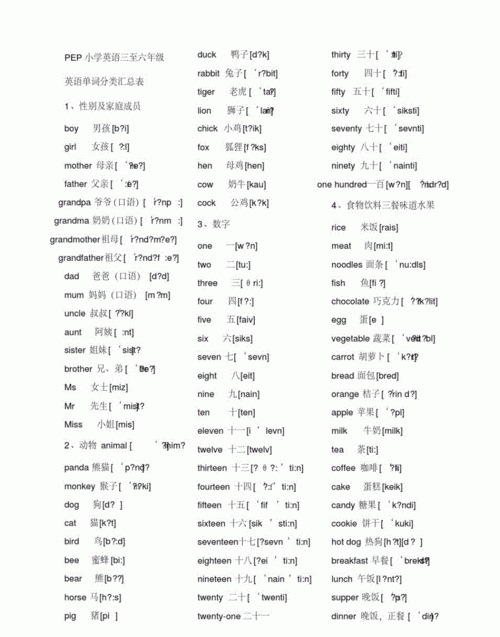本文目录
小学三至六年级英语单词表{包括黑、白体、五角星 的单词} 拜托了
小学英语词汇表
PEP英语三年级(上册)三会单词:
Unit 1:pen 钢笔 pencil 铅笔 pencil-case 铅笔盒 ruler尺
Eraser橡皮 crayon蜡笔 book 书 bag 书包
sharpener 卷笔刀 school 学校
Unit 2: head头 face 脸 nose 鼻子 mouth 嘴 eye 眼睛
ear耳朵 arm 胳膊 finger 手指 leg 腿 foot 脚
body 身体
Unit 3:red 红色的 yellow 黄色的 green 绿色的 blue 蓝色的
purple 紫色的 white 白色的 black 黑色的 orange 橙色的
pink 粉色的 brown 棕色的
Unit 4:cat 猫 dog 狗 monkey 猴子 panda 熊猫 rabbit兔子
duck 鸭子 pig 猪 bird 鸟 bear 熊 elephant 大象
mouse 老鼠 squirrel 松鼠
Unit 5:cake 蛋糕 bread 面包 hot dog 热狗 hamburger 汉堡包 chicken 鸡肉 French fries 榨薯条 Coke 可乐 juice 果汁 milk 牛奶 water水 tea 茶 coffee 咖啡
Unit 6:one 一 two 二 three 三 four 四 five 五 six六 seven 七 eight 八 nine(九 ten十 doll 玩具娃娃 boat 小船
ball 球 kite 风筝 balloon 气球 car 小汽车 plane 飞机
PEP英语三年级(下册)三会单词:
Unit 1:boy 男孩 girl 女孩 teacher 教师 student 学生 this 这个
my 我的 friend 朋友 I’m=I am 我是 nice 好的;愉快的
good morning 早上好 good afternoon下午好
meet 遇见;碰见 goodbye 再见 too 也:太
Unit 2:father 父亲爸爸 dad 爸爸(口语) mother 母亲;妈妈
mom 妈妈(口语) man 男人 woman女人 grandmother外祖母grandma (口语)(外)祖母 grandfather(外)祖父
grandpa (口语)(外)祖父 sister 姐妹 brother兄妹
let’s=let us 让我们 great 太好了 really 真地;确切地
and 和;并且 how 多么;怎么样
Unit 3:eleven 十一 twelve十二 thirteen 十三 fourteen 十四
fifteen十五 sixteen 十六 seventeen 十七
eighteen 十八 nineteen 十九 twenty 二十
how many 多少 can 能够;可以 look at 看;瞧
Unit 4:peach (桃) pear (梨) orange (橙子) watermelon (西瓜)
apple (苹果) banana (香蕉) strawberry (草莓) grape (葡萄)
like (喜欢) some (一些;某些) thanks (多谢)
Unit 5:bus (公共汽车) bike (自行车) taxi (出租车) jeep (吉车)
desk( 课桌) chair (椅子) walkman (随身听) lamp (台灯) your (你的;你们的)zoo (动物园)
Unit 6:small (小的) big (大的) long (长的) short (短的;矮的)
tall (高的) giraffe (长颈鹿) deer (鹿)
PEP四年级(上册)四会单词词汇表:
Unit 1:window(窗户) board(写字板) light(灯,灯管) picture(画,图画)
door (门) floor(地板 ) classroom(教室) computer(计算机) teacher"s desk(讲台) wall(墙) fan(扇子,电扇)
classmate(同学) have(我们)有 new(新的 go(去)
where (在......哪里) many(许多的) our(我们的)
clean(打扫,清洁,擦干净的) good idea(好主意)
have a look(看一看) all right(好吧,好的) seat(座位)
good job(干的好) near(在......的旁边) you(你) what(什么see(看) in(在......里面) me(我)the(这个,这里) look at(看)
we(我们)
Unit 2:Chinese book(语文书) pencil(铅笔) English book(英语书) twenty-one(二十一) math book(数学书) thirty-one(三十一) schoolbag(书包) forty-one(四十一) stiry-book(故事书) fifty(五十) notebook(笔记本) too many(太多)
colour(颜色) fat(胖的) heavy(重的;沉重的) may (可以) what’s=what is sure(当然可以) sorry(对不起)
here you are(给你) book(书) bag(包 ) ruler(尺子)
pen(钢笔) pencil-case (铅笔盒)
Unit 3:jacket(夹克衫) shirt(衬衫) skirt(裙子) dress(连衣裙)
T-shirt(T恤衫) red(红色的) blue(蓝色的) yellow(黄色的) green(绿色的 ) white(白色的) no(不;不是) not(不;不是的) colour(颜色)
Unit 4:warm(暖和的) cold(寒冷的) cool(凉爽的) today(今天)
jeans(牛仔裤) pants(长裤) socks(袜子) shoes(鞋子)
let’s=let us play(玩;踢) football(足球) snowy(下雪的)
sunny(晴朗的)
Unit 5:how much(多少钱) big(大的) small(小的) long(长的)
short(短的) apple(苹果) banana(香蕉) pear(梨) orange(橙子) watermelon(西瓜) are(是) they 它(他、她)们
Unit 6:horse(马) aren’t=arenot cat(猫) rabbit(兔子) pig(猪) duck(鸭子) dog(狗) eleven(十一) twelve(十二) thirteen(十三) fifteen(十五) twenty(二十) how many(多少) there(那儿;那里)
PEP四年级(下册)四会单词词汇表:
Unit 1:computer(计算机) board(写字板) fan(风扇) light(灯)
this(这;这个) is(是) my(我的) that(那;那个) your(你的)
teacher’s desk(讲台) picture(图画;照片) wall(墙壁)
floor(地板) yes(是;是的) it(它)
Unit2 one(一) two(二) three(三) four(四) five(五) six(六 )seven(七) eight(八) nine(九) ten(十) what(什么) time(时间)
it’s=it is …o’clock(…点钟) math(数学) Chinese(语文) English(英语) P.E.(体育) music(音乐) for(为;给) class(课程)
Unit 3:jacket(夹克衫) shirt(衬衫) skirt(裙子) dress(连衣裙)
T-shirt(T恤衫) red(红色的) blue(蓝色的) yellow(黄色的) green(绿色的) white(白色的) no(不;不是) not(不;不是的) colour(颜色)
Unit 4:warm(暖和的) cold(寒冷的) cool(凉爽的) today(今天)
jeans(牛仔裤) pants(长裤) socks(袜子) shoes(鞋子)
let’s=let us play(玩;踢) football(足球) snowy(下雪的) sunny(晴朗的)
Unit 5:how much(多少钱) big(大的) small(小的) long(长的)
short(短的) apple(苹果) banana(香蕉) pear(梨)
orange(橙子) watermelon(西瓜) are(是) they 它(他、她)们
Unit 6:horse(马) aren’t=are not cat(猫) rabbit(兔子) pig(猪)
duck(鸭子) dog(狗) eleven(十一) twelve(十二) thirteen(十三)
fifteen(十五) twenty(二十) how many(多少) there(那儿;那里)
PEP五年级(上册)四会单词词汇表:
Unit 1:Young (年轻的) funny (滑稽可笑的) tall (高的)
strong (强壮的) kind (和蔼的、亲切的) old (年老的)
short(矮的) thin (瘦的) Mr (先生) like (像、喜欢)
strict (严格的) smart(聪明的、巧妙的)
active (积极的、活跃的) quiet (安静的、文静的)
very(很、非常) but (但是)
Unit 2:Monday (星期一)Tuesday (星期二) Wednesday (星期三)
Thursday(星期四) Friday (星期五) Saturday (星期六)
Sunday (星期天) day (天) have (有、吃)
on (在…..时候) do homework (做作业)
watch TV (看电视) read books (读书)
Unit 3:eggplant (茄子) fish (鱼) green beans (青豆)
tofu (豆腐) potato (土豆) tomato (西红柿) for (为)
lunch (中餐) we(我们) tasty (好吃的) sweet (甜的)
sour (酸的) fresh(新鲜的) salty (咸的)
favourite (最喜欢的) they are (他们是)fruit (水果)
grape (葡萄)
Unit 4:Cook the meals (烧饭) water the flowers (浇花)
sweep the floor (扫地) clean the bedroom (打扫卧室)
make the bed(铺床) set the table (摆饭桌)
wash the clothes (洗碗碟) do the dishes (收拾衣服)
use a computer (使用计算机)
Unit 5:curtain (空调) trash bin (垃圾箱) closet (壁橱)
mirror(镜子) end table (床头柜) bedroom (卧室)
kitchen (厨房)bathroom (卫生间) living room (客厅)
in (在…里面) on(在…上面) under (在…下面)
near (在..旁边) behind (在…后边)clothes (衣服)
Unit 6:river (河流) flower (花) grass (草)lake (湖泊)
forest(森林)path (路) pake (公园) picture (照片)
hourse (房子)bridge (桥) tree (树) road (公路)
building (建筑物)clean (干净的)
PEP五年级(下册)四会单词词汇表:
Unit 1:do morning exercises(晨练) eat breakfast(吃早饭)
have English class(上英语课) play sports(进行体育运动)
eat dinner(吃晚饭) when(什么时候) evening(夜晚;晚上) get up(起床)at(在……点钟) usually(通常;一般)
noon(中午) climb mountains(爬山)
go shopping(购物;买东西) play the piano(弹钢琴) visit grandparents(看望祖父母) go hiking(去远足)
weekend(周末) often(经常) sometimes(有时候)
Unit 2:spring(春天) summer(夏天) fall(秋天)
winter(冬天) season季节) which(哪一个)
best(最;极) swim(游泳) fly kites(放风筝)
skate(滑冰;滑冰鞋) make a snowman(堆雪人)
plant trees(种树) why(为什么) because(因为)
sleep(睡觉)
Unit 3:Jan./January(一月) Feb./February(二月) Mar./March(三月) Apr./April(四月) May(五月) June(六月) July(七月) Aug./Augest(八月) Sept./September(九月)
Oct./October(十月) Nov./November(十一月)
Dec./December(十二月) birthday(生日) uncle(叔叔;舅舅)
her(她的) date(日期)
Unit 4:draw pictures(画画) cook dinner(做饭) read a book(看书)
answer the phone(接电话) listen to music9(听音乐)
clean the room(打扫房间) write a letter(写信)
write an e-mail(写电子邮件) mom(妈妈) grandpa(爷爷;外公)study(书房)
Unit 5:fly(飞) jump(跳) walk(走) run(跑) swim(游泳)kangaroo(袋鼠) sleep(睡觉) climb(往上爬) fight(打架)swing(荡;荡秋千) drink water(喝水)
Unit 6:take pictures(照相) watch insects(观察昆虫)
pick up leaves(采摘树叶) do an experiment(做实验)
catch butterfly(捉蝴蝶) honey(蜂蜜)
count insects(数昆虫) collect leaves(收集树叶)
wtite a report(写报告) play chess(下棋)
have a picnic(举行野餐)
PEP六年级(上册)四会单词词汇表:
Unit 1:by (经,乘) foot(脚) bike(自行车) bus(公共汽车)
train(火车) how(怎样) go to school(上学) traffic(交通) traffic light(交通灯) traffic rule(交通规则)
stop(停,停车站) wait(等待) get to(到达)
Unit 2:library(图书馆) post office(邮局) hospital(医院)
cinema(电影院) bookstore(书店) where(在哪里,到哪里) please(请) next to(与…相邻) turn(转弯) right (右边)
left(左边) straight(成直线地) then(然后)
Unit 3: next week(下周) this morning(今天上午)
this afternoon(今天下午) this evening (今天晚上)
comic book(漫画书) post card(明信片) newspaper(报纸)
buy(购买)
Unit 4: hobby(爱好) ride a bike--riding a bike(骑自行车)
dive--diving(跳水)
play the violin—playing the violin(拉小提琴)
make kites—making kites(制作风筝)
collect stamps—collecting stamps(集邮)
live –lives(居住) teach--teaches(教) go--goes(去)
watch--watches(看) read--reads(读,看)
does doesn’t=does not
Unit 5:singer(歌唱家,歌手) writer(作家) actor(男演员)
actress(女演员) artist(画家) TV reporter(电视台记者) engineer(工程师) accountant(会计) policeman(男警察) salesperson(销售员) cleaner(清洁工)
where(在哪里,到哪里) work(工作)
Unit 6:rain(雨) cloud (云) sun(太阳) stream(河,溪)
come from(来自,从…来) seed(种子) soil(土壤)
sprout (苗,芽) plant(植物,种植) should (应该)
then(然后)
PEP六年级(下册)四会单词词汇表:
Unit 1:tall—taller更高的 short—shorter 更矮的
strong—stronger更强壮的 old—older 年龄更大的
young—younger 更年轻的 big—bigger更大的
heavy—heavier 更重的 long—longer 更长的
thin—thinner 更瘦的 small—smaller (体型)更小的
Unit 2:have a fever 发烧 have a sore throat喉咙疼
have a cold感冒 have a toothache 牙疼
have a headache 头疼 matter事情,麻烦
sore 疼的 hurt疼痛 nose 鼻子 tired疲劳的,累的 excited兴奋的 angry生气的 happy高兴的
bored无聊的,烦人的 sad 忧伤的,悲伤的
Unit 3:watch—watched 看 wash—washed 洗 clean—cleaned打扫
play—played玩 visit—visited 看望
do—did last weekend上一个周末
go—went去
go to a park—went to a park 去公园
go swimming—went swimming去游泳
go fishing—went fishing去钓鱼
read—read 读
go hiking—went hiking 去郊游
Unit 4:learn Chinese—learned Chinese学汉语
sing and dance—sang and danced 唱歌和跳舞
eat good food—ate good food吃好吃的食物
take pictures—took pictures 照相
climb—climbed 爬 have—had
buy presents—bought presents买礼物
row a boat—rowed a boat 划船
see elephant—saw elephant 看大象
go skiing—went skiing 去滑雪
go ice-skating—went ice-skating 去滑冰
how怎么,如何 get—got 到达
last上一个的,仅余的,留在最后的

小学英语3至6年级单词词汇表
只有四会词的
四年级上册四会单词词汇表:
Unit 1 window(窗户) board (黑板) light(灯) picture(图片)
door(门) floor(地板) classroom(教室) computer(电脑)
teacher’desk(讲台) wall(墙) fan(风扇)
Unit 2 bag(包) pencil(铅笔) pen(钢笔) book(书)
ruler(尺子) pencil-case(铅笔盒)
Unit 3 teacher(教师) student(学生) boy(男孩) girl(女孩)
friend(朋友)
Unit 4 home(家) room(房间) school(学校) classroom(教室)
window(窗户) desk(课桌;书桌) door(门) chair(椅子) bed(床)
Unit 5 rice(米饭) beef(牛肉) bread(面包) milk(牛奶)
egg(蛋) water(水) chicken(鸡肉) fish(鱼)
Unit 6 sister(姐妹) brother(兄弟) father(父亲;爸爸)
mother(妈妈) driver(司机) doctor(医生) farmer(农民)
nurse(护士)
PEP四年级下册四会词词汇表:
Unit 1 computer(电脑) board(黑板) fan(风扇) light(灯)
this(这;这个) is(是) my(没有) that(那个) your(你的)
teacher’s desk(讲台) picture(图画;照片) wall(墙)
floor(地板) yes(是;是的) it(它)
Unit 2 one(一) two(二) three(三) four(四) five(五)
six(六) seven(七) eight(八) nine(九) ten(十) what(什么) time(时间) it’s=it is …o’clock(…点钟)
math(数学) Chinese(语文) English(英语) P.E.(体育)
music(音乐) for(为;给) class(课程)
Unit 3 jacket(夹克衫) shirt(衬衫) skirt(裙子) dress(连衣裙)
T-shirt(T恤衫) red(红色的) blue(蓝色的) yellow(黄色的)
green(绿色的) white(白色的) no(不;不是) not(不;不是的)
color(颜色)
Unit 4 warm(暖和的) cold(寒冷的) cool(凉爽的) today(今天)
jeans(牛仔裤) pants(长裤) socks(袜子) shoes(鞋子)
let’s=let us(让我们) play(玩;踢) football(足球) snowy(下雪的)
sunny(晴朗的)
Unit 5 how much(多少钱) big(大的) small(小的) long(长的)
short(短的) apple(苹果) banana(香蕉) pear(梨子) orange(橙子)
watermelon(西瓜) are(是) they它(他、她)们
Unit 6 horse(马) aren’t=are not cat(猫) rabbit(兔子) pig(猪)
duck(鸭子) dog(狗) eleven(十一) twelve(十二) thirteen(十三)
fifteen(十五) twenty(二十) how many(多少) there(那儿;那里)
五年级上册四会单词词汇表
Unit 1 young(年轻的) funny(滑稽可笑的) tall(高的)
strong(强壮的)kind(和蔼的) old(年老的) short(矮的) thin(瘦的) Mr(先生)like(像、喜欢) strict(严格的) smart(聪明的、巧妙的)active(积极的、活跃的) quite(安静的、文静的)
very(很、非常) but(但是)
Unit 2 Monday(星期一) Tuesday(星期二) Wednesday(星期三)
Thursday(星期四) Friday(星期五) Saturday(星期六) Sunday(星期天)
day(天) have(有、吃) on(在……时候) do homework(做作业)
watch TV(看电视) read books(读书)
Unit 3 eggplant(茄子) fish(鱼) green beans(青豆) tofu(豆腐)
potato(土豆) tomato(西红柿) for(为) lunch(中饭) we(我们)
tasty(好吃的) sweet(甜的)sour(酸的) fresh(新鲜的) salty(咸的)
favourite(最喜爱的) they are(他们) fruit(水果)grape(葡萄)
Unit 4 cook the meals(煮饭) water the flowers(浇花)
sweep the floor(扫地)clean the bedroom(打扫卧室)
make the bed(铺床) set the table(摆饭桌) wash the clothes(洗衣服)
do the dishes(洗碗碟) use a computer(使用计算机)
Unit 5 air-condition(空调) curtain(窗帘) trash bin(垃圾箱)
closet(壁橱) mirror(镜子) end table(床头柜) bedroom(卧室)
kitchen(厨房)bathroom(卫生间) living room(客厅) in(在…里面)
on(在..里面) under(在…下面) near(在…旁边) behind(在…后面) clothes(衣服)
Unit 6 river(河流) flower(花)grass(草)lake(湖泊)forest(森林)
path(路) park(公园) picture(照片) house(房子) bridge(桥)
tree(树) road(公路) building(建筑物) clean(干净的)
五年级下册四会单词词汇表
Unit 1 do morning exercises(晨练) eat breakfast(吃早餐饭)
have English(上英语课) play sports(进行体育运动)
eat dinner(吃晚饭)when(什么时候)evening(夜晚;晚上)get up(起床)
at(在……点)usually(通常;一般) noon(中午)climb mountains(爬山)
shopping(购物;买东西) play the piano(弹钢琴)
visit grandparents(看望祖父母) go hiking(去远足) weekend(周末)
often(经常) sometimes(有时候)
Unit 2 spring(春天) summer(夏天) fall(秋天) winter(冬天)
season(季节) which(哪一个) best(最;极) swim(游泳)
fly kites(放风筝) skate(滑冰;滑冰鞋) make a snowman(堆雪人)
plant trees(种树) why(为什么) because(因为) sleep(睡觉)
Unit 3
Jan./January(一月) Feb./February(二月) Mar./March(三月)
Apr./April(四月) May(五月) June(六月) July(七月)
Aug./August(八月) Sept./September(九月) Oct./October(十月)
Nov./November(十一月) Dec./December(十二月) birthday(生日)
uncle(叔叔;舅舅) her(她的) date(日期)
Unit 4 draw pictures(画画) cook dinner(做饭) read a book(读书)
answer the phone(接电话) listen to music(听音乐)
clean the room(打扫房间) write a letter(写信)
write an e-mail(写电子邮件) mom(妈妈) grandpa(爷爷;外公)
study(书房)
Unit 5 fly(飞) jump(跳) walk(走) run(跑) swim(游泳)
kangaroo(袋鼠) sleep(睡觉) climb(往上爬) fight(打架)
swing(荡;荡秋千) drink water(喝水)
Unit 6 take picture(照相) watch insects(观察昆虫)
pick up leaves(采摘树叶) do an experiment(做实验)
catch butterflies(捕捉蝴蝶) honey(蜂蜜) count insects(数昆虫)
collect leaves(收集树叶) write a report(写报告)
play chess(下棋) have a picnic(举行野餐)
六年级上册四会单词词汇表
Unit 1 by(经,乘)foot(脚)bike(自行车)bus(公共汽车)train(火车)
how(怎样) go to school(上学) traffic(交通) traffic light(交通灯)
traffic rule(交通规则) stop(停,停车站) wait(等待) get to(到达)
Unit 2 library(图书馆) post office(邮局) hospital(医院)
cinema(电影院) bookstore(书店) where(在哪里,到哪里) please(请)
next to(与…相邻) turn(转弯) right(右边) left(左边)
straight(成直线地) then(然后)
Unit 3 next week(下周) this morning(今天上午)
this afternoon(今天下午)this evening(今天晚上) comic book(漫画书)
post card(明信片) newspaper(报纸) buy(购买)
Unit 4 hobby(爱好) ride a bike-riding a bike(骑自行车)
dive-diving(跳水) play the piano-playing the piano(拉小提琴)
make kites-making kites(制作风筝)
collect stamps-collecting stamps(集邮) live-lives(居住)
teach-teaches(教) go-goes(去) watch-watches(看)
read-reading(读;看) does doesn’t=does not
Unit 5 singer(歌唱家,歌手) writer(作家) actor(男演员)
actress(女演员) artist(画家) TV reporter(电视台记者)
engineer(工程师) accountant(会计) policeman(男警察)
salesperson(销售员) cleaner(清洁工) where(在哪里) work(工作)
Unit 6 rain(雨) cloud(云) sun(太阳) stream(河,溪)
come from(来自,从…哪里来) seed(种子) soil(土壤)
sprout(苗;芽) plant(植物,种植) should(应该) then(然后)
六年级下册四会单词词汇表
Unit 1 tall-taller更高的 short-shorter更矮的
strong-stronger更强壮的 old-older年龄更大的
young-younger更年轻的 big-bigger更大的heavy-heavier更重的 long-longer更长的 thin-thinner更瘦的 small-smaller(体型)更小的
Unit 2 have a fever发烧 have a sore throat喉咙疼 have a cold感冒
have a toothache牙疼 have a headache头疼 matter事情,麻烦 sore疼的
hurt疼痛 nose鼻子 tired疲劳的,累的 excited兴奋的 angry生气的
happy高兴的 bored无聊的,烦人的 sad忧伤的,悲伤的
Unit 3 watch-watched看 wash-washed洗 clean-cleaned打扫
play-played玩 visit-visited看望 do-did last weekend上一个周末
go-went去 go to a park-went to a park去公园
go swimming-went swimming去游泳 go fishing-went fishing去钓鱼
read-read读 go hiking-went hiking去郊游
Unit 4 learn Chinese-learn Chinese学汉语
sing and dance-sang and danced唱歌和跳舞
eat good food-ate good food吃好吃的食物
take pictures-took pictures照相 climb-climbed爬 have-had
buy presents-bought presents买礼物 row a boat-rowed a boat划船
see elephant-saw elephant看大象 go skiing-went skiing去滑雪
go ice-skating–went ice-skating去滑冰 how怎么;如何
get-got到达 last上一个的,仅余的,留在最后的

小学3-6年级英语单词大全分类PEP
Unit 1
pen 钢笔
pencil 铅笔
pencil-case 铅笔盒
ruler 尺子
eraser 橡皮
crayon 蜡笔
book 书
bag 书包
sharpener 卷笔刀
school 学校
Unit 2
head 头
face 脸
nose 鼻子
mouth 嘴
eye 眼睛
ear 耳朵
arm 胳膊
finger 手指
leg 腿
foot 脚
body 身体
Unit3
red 红色的
yellow 黄色的
green 绿色的
blue 蓝色的
purple 紫色的
white 白色的
black 黑色的
orange 橙色的
pink 粉色的
brown 棕色的
Unit 4
cat 猫
dog 狗
monkey 猴子
panda 熊猫
rabbit 兔子
duck 鸭子
pig 猪
bird 鸟
bear 熊
elephant 大象
mouse 老鼠
squirrel 松鼠
Unit 5
cake 蛋糕
bread 面包
hot dog 热狗
hamburger 汉堡包
chicken 鸡肉
French fries 榨薯条
Coke 可乐
juice 果汁
milk 牛奶
water 水
tea 茶
coffee 咖啡
Unit 6
one 一
two 二
three 三
four 四
five 五
six 六
seven 七
eight 八
nine 九
ten 十
doll 玩具娃娃
boat 小船
ball 球
kite 风筝
balloon 气球
car 小汽车
plane 飞机
PEP英语三年级(下册)三会单词
Unit 1
boy 男孩 girl 女孩teacher 教师student 学生this 这个my 我的friend 朋友I’m=I am 我是nice 好的;愉快的good morning 早上好good afternoon 下午好meet 遇见;碰见goodbye 再见too 也;太
Unit 2
father 父亲;爸爸dad 爸爸(口语)mother 母亲;妈妈mom 妈妈(口语)man 男人woman 女人grandmother (外)祖母grandma (口语)(外)祖母grandfather (外)祖父grandpa (口语)(外)祖父sister 姐妹brother 兄妹let’s=let us 让我们great 太好了really 真地;确切地and 和;并且how 多么;怎么样
Unit 3
eleven 十一twelve 十二thirteen 十三fourteen 十四fifteen 十五sixteen 十六
seventeen 十七eighteen 十八nineteen 十九twenty 二十how many 多少
can 能够;可以look at 看;瞧
Unit 4
peach 桃pear 梨orange 橙子watermelon 西瓜apple 苹果banana 香蕉
strawberry 草莓grape 葡萄like 喜欢some 一些;某些thanks 多谢
Unit 5
bus 公共汽车bike 自行车taxi 出租车jeep 吉普车desk 课桌
chair 椅子walkman 随身听lamp 台灯your 你的;你们的zoo 动物园
Unit 6
small 小的big 大的long 长的short 短的;矮的tall 高的giraffe 长颈鹿
deer 鹿
PEP四年级上册四会单词词汇表
Unit 1
computer(计算机) board(写字板) fan(风扇) light(灯) this(这;这个) is(是)
my(我的) that(那;那个) your(你的) teacher’s desk(讲台) picture(图画;照片) wall(墙壁) floor(地板) yes(是;是的) it(它)
Unit 2
one(一) two(二) three(三) four(四) five(五) six(六) seven(七) eight(八) nine(九) ten(十) what(什么) time(时间) it’s=it is …o’clock(…点钟) math(数学) Chinese(语文) English(英语) P.E.(体育) music(音乐) for(为;给) class(课程)
Unit 3
jacket(夹克衫) shirt(衬衫) skirt(裙子) dress(连衣裙) T-shirt(T恤衫) red(红色的) blue(蓝色的) yellow(黄色的) green(绿色的) white(白色的) no(不;不是) not(不;不是的) colour(颜色)
Unit 4
warm(暖和的) cold(寒冷的) cool(凉爽的) today(今天) jeans(牛仔裤) pants(长裤) socks(袜子) shoes(鞋子) let’s=let us play(玩;踢) football(足球) snowy(下雪的) sunny(晴朗的)
Unit 5
how much(多少钱) big(大的) small(小的) long(长的) short(短的) apple(苹果) banana(香蕉) pear(梨) orange(橙子) watermelon(西瓜) are(是)
they 它(他、她)们
Unit 6
horse(马) aren’t=are not cat(猫) rabbit(兔子) pig(猪) duck(鸭子) dog(狗) eleven(十一) twelve(十二) thirteen(十三) fifteen(十五) twenty(二十) how many(多少) there(那儿;那里)
PEP四年级下册四会单词词汇表
Unit 1
computer(计算机) board(写字板) fan(风扇) light(灯) this(这;这个) is(是)
my(我的) that(那;那个) your(你的) teacher’s desk(讲台) picture(图画;照片) wall(墙壁) floor(地板) yes(是;是的) it(它)
Unit 2
one(一) two(二) three(三) four(四) five(五) six(六) seven(七) eight(八) nine(九) ten(十) what(什么) time(时间) it’s=it is …o’clock(…点钟) math(数学) Chinese(语文) English(英语) P.E.(体育) music(音乐) for(为;给) class(课程)
Unit 3
jacket(夹克衫) shirt(衬衫) skirt(裙
子) dress(连衣裙) T-shirt(T恤衫) red(红色的) blue(蓝色的) yellow(黄色的) green(绿色的) white(白色的) no(不;不是) not(不;不是的) colour(颜色)
Unit 4
warm(暖和的) cold(寒冷的) cool(凉爽的) today(今天) jeans(牛仔裤) pants(长裤) socks(袜子) shoes(鞋子) let’s=let us play(玩;踢) football(足球) snowy(下雪的) sunny(晴朗的)
Unit 5
how much(多少钱) big(大的) small(小的) long(长的) short(短的) apple(苹果) banana(香蕉) pear(梨) orange(橙子) watermelon(西瓜) are(是)
they 它(他、她)们
Unit 6
horse(马) aren’t=are not cat(猫) rabbit(兔子) pig(猪) duck(鸭子) dog(狗) eleven(十一) twelve(十二) thirteen(十三) fifteen(十五) twenty(二十) how many(多少) there(那儿;那里)
PEP五年级上册四会单词词汇表
Unit 1
Young (年轻的) funny (滑稽可笑的) tall (高的)
strong (强壮的) kind (和蔼的、亲切的) old (年老的) short (矮的)thin (瘦的) Mr (先生) like (像、喜欢) strict (严格的) smart (聪明的、巧妙的) active (积极的、活跃的) quiet (安静的、文静的)very (很、非常) but (但是)
Unit 2
Mondy (星期一) Tuesday (星期二) Wednesday (星期三) Thursday (星期四) Friday (星期五) Saturday (星期六) Sunday (星期天) day (天) have (有、吃) on (在…..时候) do homework (做作业) watch TV (看电视) read books (读书)
Unit 3
eggplant (茄子) fish (鱼) green beans (青豆) tofu (豆腐) potato (土豆) tomato (西红柿) for (为) lunch (中餐) we (我们) tasty (好吃的) sweet (甜的) sour (酸的) fresh (新鲜的) salty (咸的) favourite (最喜欢的) they are (他们是) fruit (水果) grape (葡萄)
Unit 4
Cook the meals (倒垃圾) water the flowers (浇花) sweep the floor (扫地) clean the bedroom (打扫卧室) make the bed (铺床) set the table (摆饭桌)wash the clothes (洗碗碟) do the dishes (收拾衣服) use a computer (使用计算机
Unit 5
curtain (空调) trash bin (垃圾箱) closet (壁橱) mirror (镜子) end table (床头柜) bedroom (卧室) kitchen (厨房) bathroom (卫生间) living room (客厅) in (在…里面) on (在…上面) under (在…下面) near (在..旁边) behind (在…后边) clothes (衣服)
Unit 6
river (河流) flower (花) grass (草) lake (湖泊) forest (森林) path (路) pake (公园) picture (照片) hourse (房子) bridge (桥) tree (树) road (公路) building (建筑物) clean (干净的)
PEP五年级下册四会单词词汇表
Unit 1
do morning exercises(晨练) eat breakfast(吃早饭) have english class(上英语课) play sports(进行体育运动) eat dinner(吃晚饭) when(什么时候) evening(夜晚;晚上) get up(起床) at(在……点钟) usually(通常;一般) noon(中午) climb mountains(爬山) go shopping(购物;买东西) play the piano(弹钢琴) visit grandparents(看望祖父母) go hiking(去远足) weekend(周末) often(经常) sometimes(有时候)
Unit 2
spring(春天) summer(夏天) fall(秋天) winter(冬天) season季节) which(哪一个) best(最;极) swim(游泳) fly kites(放风筝) skate(滑冰;滑冰鞋) make a snowman(堆雪人) plant trees(种树) why(为什么) because(因为) sleep(睡觉)
Unit 3
Jan./January(一月) Feb./February(二月) Mar./March(三月) Apr./April(四月) May(五月) June(六月) July(七月) Aug./Augest(八月) Sept./September(九月) Oct./October(十月) Nov./November(十一月) Dec./December(十二月) birthday(生日) uncle(叔叔;舅舅) her(她的) date(日期)
Unit 4
draw pictures(画画)cook dinner(做饭) read a book(看书)answer the phone(接电话) listen to music9(听音乐) clean the room(打扫房间) write a letter(写信)write an e-mail(写电子邮件) mom(妈妈)grandpa(爷爷;外公)study(书房)
Unit 5
fly(飞) jump(跳) walk(走) run(跑) swim(游泳) kangaroo(袋鼠) sleep(睡觉) climb(往上爬) fight(打架) swing(荡;荡秋千) drink water(喝水)
Unit 6
take pictures(照相) watch insects(观察昆虫) pick up leaves(采摘树叶) do an experiment(做实验) catch butterfly(捉蝴蝶) honey(蜂蜜) count insects(数昆虫) collect leaves(收集树叶) wtite a report(写报告) play chess(下棋) have a picnic(举行野餐)
PEP六年级上册四会单词词汇表
Unit 1
by (经,乘) foot(脚) bike(自行车) bus(公共汽车) train(火车) how(怎样) go to school(上学) traffic(交通) traffic light(交通灯) traffic rule(交通规则) stop(停,停车站)wait(等待) get to(到达)
Unit 2
library(图书馆) post office(邮局) hospital(医院) cinema(电影院) bookstore(书店) where(在哪里,到哪里) please(请) next to(与…相邻) turn(转弯) right (右边) left(左边) straight(成直线地) then (然后)
Unit 3
next week(下周) this morning(今天上午) this afternoon(今天下午) this evening (今天晚上) comic book(漫画书) post card(明信片) newspaper(报纸) buy(购买)
Unit 4
hobby(爱好) ride a bike--riding a bike(骑自行车) dive--diving(跳水) play the violin—playing the violin(拉小提琴) make kites—making kites(制作风筝) collect stamps—collecting stamps(集邮) live –lives(居住) teach--teaches(教) go--goes(去) watch--watches(看) read--reads(读,看) does doesn’t=does not
Unit 5
singer(歌唱家,歌手) writer(作家) actor(男演员) actress(女演员) artist(画家) TV reporter(电视台记者) engineer(工程师) accountant(会计) policeman(男警察) salesperson(销售员) cleaner(清洁工) where(在哪里,到哪里) work(工作)
Unit 6
rain(雨) cloud (云) sun(太阳) stream(河,溪) come from(来自,从…来) seed(种子) soil(土壤) sprout (苗,芽) plant(植物,种植) should (应该) then(然后)
PEP六年级下册四会单词词汇表
Unit 1
tall—taller更高的 short—shorter 更矮的 strong—stronger 更强壮的 old—older 年龄更大的 young—younger 更年轻的 big—bigger 更大的heavy—heavier 更重的 long—longer 更长的 thin—thinner 更瘦的 small—smaller (体型)更小的
Unit 2
have a fever 发烧 have a sore throat喉咙疼 have a cold感冒 have a toothache 牙疼 have a headache 头疼 matter事情,麻烦 sore 疼的 hurt疼痛 nose 鼻子 tired疲劳的,累的 excited兴奋的 angry生气的 happy高兴的 bored无聊的,烦人的 sad 忧伤的,悲伤的
Unit 3
watch—watched 看 wash—washed 洗 clean—cleaned打扫 play—played玩 visit—visited 看望 do—did last weekend 上一个周末 go—went去 go to a park—went to a park 去公园 go swimming—went swimming去游泳 go fishing—went fishing去钓鱼 read—read 读 go hiking—went hiking 去郊游
Unit 4
leran Chinese—learned Chinese学汉语 sing and dance—sang and danced 唱歌和跳舞 eat good food—ate good food吃好吃的食物 take pictures—took pictures 照相 climb—climbed 爬 have—had buy presents—bought presents买礼物 row a boat—rowed a boat 划船 see elephant—saw elephant 看大象 go skiing—went skiing 去滑雪 go ice-skating—went ice-skating 去滑冰 how怎么,如何 get—got 到达 last 上一个的,仅余的,留在最后的

小学36年级英语单词
Unit 1
pen 钢笔
pencil 铅笔
pencil-case 铅笔盒
ruler 尺子
eraser 橡皮
crayon 蜡笔
book 书
bag 书包
sharpener 卷笔刀
school 学校
Unit 2
head 头
face 脸
nose 鼻子
mouth 嘴
eye 眼睛
ear 耳朵
arm 胳膊
finger 手指
leg 腿
foot 脚
body 身体
Unit3
red 红色的
yellow 黄色的
green 绿色的
blue 蓝色的
purple 紫色的
white 白色的
black 黑色的
orange 橙色的
pink 粉色的
brown 棕色的
Unit 4
cat 猫
dog 狗
monkey 猴子
panda 熊猫
rabbit 兔子
duck 鸭子
pig 猪
bird 鸟
bear 熊
elephant 大象
mouse 老鼠
squirrel 松鼠
Unit 5
cake 蛋糕
bread 面包
hot dog 热狗
hamburger 汉堡包
chicken 鸡肉
French fries 榨薯条
Coke 可乐
juice 果汁
milk 牛奶
water 水
tea 茶
coffee 咖啡
Unit 6
one 一
two 二
three 三
four 四
five 五
six 六
seven 七
eight 八
nine 九
ten 十
doll 玩具娃娃
boat 小船
ball 球
kite 风筝
balloon 气球
car 小汽车
plane 飞机
PEP英语三年级(下册)三会单词
Unit 1
boy 男孩 girl 女孩teacher 教师student 学生this 这个my 我的friend 朋友I’m=I am 我是nice 好的;愉快的good morning 早上好good afternoon 下午好meet 遇见;碰见goodbye 再见too 也;太
Unit 2
father 父亲;爸爸dad 爸爸(口语)mother 母亲;妈妈mom 妈妈(口语)man 男人woman 女人grandmother (外)祖母grandma (口语)(外)祖母grandfather (外)祖父grandpa (口语)(外)祖父sister 姐妹brother 兄妹let’s=let us 让我们great 太好了really 真地;确切地and 和;并且how 多么;怎么样
Unit 3
eleven 十一twelve 十二thirteen 十三fourteen 十四fifteen 十五sixteen 十六
seventeen 十七eighteen 十八nineteen 十九twenty 二十how many 多少
can 能够;可以look at 看;瞧
Unit 4
peach 桃pear 梨orange 橙子watermelon 西瓜apple 苹果banana 香蕉
strawberry 草莓grape 葡萄like 喜欢some 一些;某些thanks 多谢
Unit 5
bus 公共汽车bike 自行车taxi 出租车jeep 吉普车desk 课桌
chair 椅子walkman 随身听lamp 台灯your 你的;你们的zoo 动物园
Unit 6
small 小的big 大的long 长的short 短的;矮的tall 高的giraffe 长颈鹿
deer 鹿
PEP四年级上册四会单词词汇表
Unit 1
computer(计算机) board(写字板) fan(风扇) light(灯) this(这;这个) is(是)
my(我的) that(那;那个) your(你的) teacher’s desk(讲台) picture(图画;照片) wall(墙壁) floor(地板) yes(是;是的) it(它)
Unit 2
one(一) two(二) three(三) four(四) five(五) six(六) seven(七) eight(八) nine(九) ten(十) what(什么) time(时间) it’s=it is …o’clock(…点钟) math(数学) Chinese(语文) English(英语) P.E.(体育) music(音乐) for(为;给) class(课程)
Unit 3
jacket(夹克衫) shirt(衬衫) skirt(裙子) dress(连衣裙) T-shirt(T恤衫) red(红色的) blue(蓝色的) yellow(黄色的) green(绿色的) white(白色的) no(不;不是) not(不;不是的) colour(颜色)
Unit 4
warm(暖和的) cold(寒冷的) cool(凉爽的) today(今天) jeans(牛仔裤) pants(长裤) socks(袜子) shoes(鞋子) let’s=let us play(玩;踢) football(足球) snowy(下雪的) sunny(晴朗的)
Unit 5
how much(多少钱) big(大的) small(小的) long(长的) short(短的) apple(苹果) banana(香蕉) pear(梨) orange(橙子) watermelon(西瓜) are(是)
they 它(他、她)们
Unit 6
horse(马) aren’t=are not cat(猫) rabbit(兔子) pig(猪) duck(鸭子) dog(狗) eleven(十一) twelve(十二) thirteen(十三) fifteen(十五) twenty(二十) how many(多少) there(那儿;那里)
PEP四年级下册四会单词词汇表
Unit 1
computer(计算机) board(写字板) fan(风扇) light(灯) this(这;这个) is(是)
my(我的) that(那;那个) your(你的) teacher’s desk(讲台) picture(图画;照片) wall(墙壁) floor(地板) yes(是;是的) it(它)
Unit 2
one(一) two(二) three(三) four(四) five(五) six(六) seven(七) eight(八) nine(九) ten(十) what(什么) time(时间) it’s=it is …o’clock(…点钟) math(数学) Chinese(语文) English(英语) P.E.(体育) music(音乐) for(为;给) class(课程)
Unit 3
jacket(夹克衫) shirt(衬衫) skirt(裙
子) dress(连衣裙) T-shirt(T恤衫) red(红色的) blue(蓝色的) yellow(黄色的) green(绿色的) white(白色的) no(不;不是) not(不;不是的) colour(颜色)
Unit 4
warm(暖和的) cold(寒冷的) cool(凉爽的) today(今天) jeans(牛仔裤) pants(长裤) socks(袜子) shoes(鞋子) let’s=let us play(玩;踢) football(足球) snowy(下雪的) sunny(晴朗的)
Unit 5
how much(多少钱) big(大的) small(小的) long(长的) short(短的) apple(苹果) banana(香蕉) pear(梨) orange(橙子) watermelon(西瓜) are(是)
they 它(他、她)们
Unit 6
horse(马) aren’t=are not cat(猫) rabbit(兔子) pig(猪) duck(鸭子) dog(狗) eleven(十一) twelve(十二) thirteen(十三) fifteen(十五) twenty(二十) how many(多少) there(那儿;那里)
PEP五年级上册四会单词词汇表
Unit 1
Young (年轻的) funny (滑稽可笑的) tall (高的)
strong (强壮的) kind (和蔼的、亲切的) old (年老的) short (矮的)thin (瘦的) Mr (先生) like (像、喜欢) strict (严格的) smart (聪明的、巧妙的) active (积极的、活跃的) quiet (安静的、文静的)very (很、非常) but (但是)
Unit 2
Mondy (星期一) Tuesday (星期二) Wednesday (星期三) Thursday (星期四) Friday (星期五) Saturday (星期六) Sunday (星期天) day (天) have (有、吃) on (在…..时候) do homework (做作业) watch TV (看电视) read books (读书)
Unit 3
eggplant (茄子) fish (鱼) green beans (青豆) tofu (豆腐) potato (土豆) tomato (西红柿) for (为) lunch (中餐) we (我们) tasty (好吃的) sweet (甜的) sour (酸的) fresh (新鲜的) salty (咸的) favourite (最喜欢的) they are (他们是) fruit (水果) grape (葡萄)
Unit 4
Cook the meals (倒垃圾) water the flowers (浇花) sweep the floor (扫地) clean the bedroom (打扫卧室) make the bed (铺床) set the table (摆饭桌)wash the clothes (洗碗碟) do the dishes (收拾衣服) use a computer (使用计算机
Unit 5
curtain (空调) trash bin (垃圾箱) closet (壁橱) mirror (镜子) end table (床头柜) bedroom (卧室) kitchen (厨房) bathroom (卫生间) living room (客厅) in (在…里面) on (在…上面) under (在…下面) near (在..旁边) behind (在…后边) clothes (衣服)
Unit 6
river (河流) flower (花) grass (草) lake (湖泊) forest (森林) path (路) pake (公园) picture (照片) hourse (房子) bridge (桥) tree (树) road (公路) building (建筑物) clean (干净的)
PEP五年级下册四会单词词汇表
Unit 1
do morning exercises(晨练) eat breakfast(吃早饭) have english class(上英语课) play sports(进行体育运动) eat dinner(吃晚饭) when(什么时候) evening(夜晚;晚上) get up(起床) at(在……点钟) usually(通常;一般) noon(中午) climb mountains(爬山) go shopping(购物;买东西) play the piano(弹钢琴) visit grandparents(看望祖父母) go hiking(去远足) weekend(周末) often(经常) sometimes(有时候)
Unit 2
spring(春天) summer(夏天) fall(秋天) winter(冬天) season季节) which(哪一个) best(最;极) swim(游泳) fly kites(放风筝) skate(滑冰;滑冰鞋) make a snowman(堆雪人) plant trees(种树) why(为什么) because(因为) sleep(睡觉)
Unit 3
Jan./January(一月) Feb./February(二月) Mar./March(三月) Apr./April(四月) May(五月) June(六月) July(七月) Aug./Augest(八月) Sept./September(九月) Oct./October(十月) Nov./November(十一月) Dec./December(十二月) birthday(生日) uncle(叔叔;舅舅) her(她的) date(日期)
Unit 4
draw pictures(画画)cook dinner(做饭) read a book(看书)answer the phone(接电话) listen to music9(听音乐) clean the room(打扫房间) write a letter(写信)write an e-mail(写电子邮件) mom(妈妈)grandpa(爷爷;外公)study(书房)
Unit 5
fly(飞) jump(跳) walk(走) run(跑) swim(游泳) kangaroo(袋鼠) sleep(睡觉) climb(往上爬) fight(打架) swing(荡;荡秋千) drink water(喝水)
Unit 6
take pictures(照相) watch insects(观察昆虫) pick up leaves(采摘树叶) do an experiment(做实验) catch butterfly(捉蝴蝶) honey(蜂蜜) count insects(数昆虫) collect leaves(收集树叶) wtite a report(写报告) play chess(下棋) have a picnic(举行野餐)
PEP六年级上册四会单词词汇表
Unit 1
by (经,乘) foot(脚) bike(自行车) bus(公共汽车) train(火车) how(怎样) go to school(上学) traffic(交通) traffic light(交通灯) traffic rule(交通规则) stop(停,停车站)wait(等待) get to(到达)
Unit 2
library(图书馆) post office(邮局) hospital(医院) cinema(电影院) bookstore(书店) where(在哪里,到哪里) please(请) next to(与…相邻) turn(转弯) right (右边) left(左边) straight(成直线地) then (然后)
Unit 3
next week(下周) this morning(今天上午) this afternoon(今天下午) this evening (今天晚上) comic book(漫画书) post card(明信片) newspaper(报纸) buy(购买)
Unit 4
hobby(爱好) ride a bike--riding a bike(骑自行车) dive--diving(跳水) play the violin—playing the violin(拉小提琴) make kites—making kites(制作风筝) collect stamps—collecting stamps(集邮) live –lives(居住) teach--teaches(教) go--goes(去) watch--watches(看) read--reads(读,看) does doesn’t=does not
Unit 5
singer(歌唱家,歌手) writer(作家) actor(男演员) actress(女演员) artist(画家) TV reporter(电视台记者) engineer(工程师) accountant(会计) policeman(男警察) salesperson(销售员) cleaner(清洁工) where(在哪里,到哪里) work(工作)
Unit 6
rain(雨) cloud (云) sun(太阳) stream(河,溪) come from(来自,从…来) seed(种子) soil(土壤) sprout (苗,芽) plant(植物,种植) should (应该) then(然后)
PEP六年级下册四会单词词汇表
Unit 1
tall—taller更高的 short—shorter 更矮的 strong—stronger 更强壮的 old—older 年龄更大的 young—younger 更年轻的 big—bigger 更大的heavy—heavier 更重的 long—longer 更长的 thin—thinner 更瘦的 small—smaller (体型)更小的
Unit 2
have a fever 发烧 have a sore throat喉咙疼 have a cold感冒 have a toothache 牙疼 have a headache 头疼 matter事情,麻烦 sore 疼的 hurt疼痛 nose 鼻子 tired疲劳的,累的 excited兴奋的 angry生气的 happy高兴的 bored无聊的,烦人的 sad 忧伤的,悲伤的
Unit 3
watch—watched 看 wash—washed 洗 clean—cleaned打扫 play—played玩 visit—visited 看望 do—did last weekend 上一个周末 go—went去 go to a park—went to a park 去公园 go swimming—went swimming去游泳 go fishing—went fishing去钓鱼 read—read 读 go hiking—went hiking 去郊游
Unit 4
leran Chinese—learned Chinese学汉语 sing and dance—sang and danced 唱歌和跳舞 eat good food—ate good food吃好吃的食物 take pictures—took pictures 照相 climb—climbed 爬 have—had buy presents—bought presents买礼物 row a boat—rowed a boat 划船 see elephant—saw elephant 看大象 go skiing—went skiing 去滑雪 go ice-skating—went ice-skating 去滑冰 how怎么,如何 get—got 到达 last 上一个的,仅余的,留在最后的

以上就是关于3到6年级单词表打印版 ,小学英语3~6年级的单词词汇表的全部内容,以及3到6年级单词表打印版 的相关内容,希望能够帮到您。

